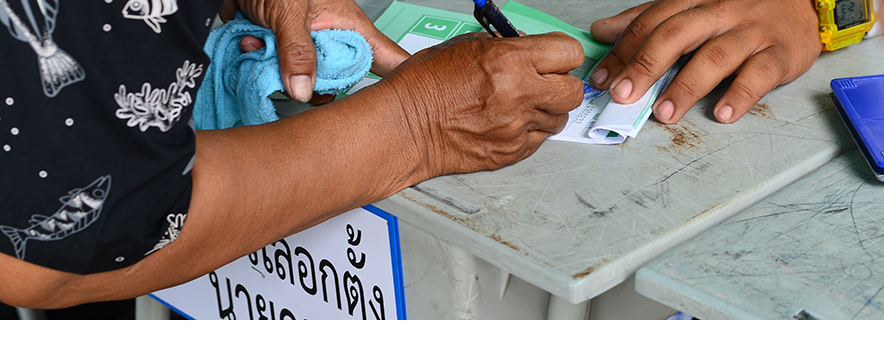Researchers: Francisco Garfias (GPS) and Darin Christensen (UCLA)
Location: Colombia
Despite individual and social benefits, most land in the developing world is not registered, in part because the cost of formalizing a title can be quite high. Researchers will implement a field experiment in Colombia that estimates the demand for land formalization and then evaluates the effects on local fiscal capacity and on private investments by households. The experiment uses a locally developed mobile assessment tool that simplifies the formalization process for households.
Researcher: Nico Ravanilla (GPS)
Location: Philippines
This project aims to test whether incorporating information technology, and specifically nontraditional means of contact between members of the community and the police, can increase information flows and improve the quality of service provision. Researchers will implement a public outreach campaign by Philippine National Police (PNP) officers in Sorsogon Province aimed at increasing flows of information between civilians and the police. The campaign will be supplemented by the use of ICT means of contact, and an evaluation of which method is most effective at increasing information flows.
Student Researchers: Sam Krumholz and Wayne Sandholtz
Location: United States
Since the inauguration of Donald Trump, the rhetoric of the US government toward undocumented immigrants has harshened significantly, leading to increased fear of deportation among many in this group. Utilizing open data on city services from the American cities with the largest undocumented immigrant populations (New York, Los Angeles, Chicago, Houston, and Dallas), researchers will examine if this fear led to measurable changes in how undocumented immigrants choose to interact with their cities.
Student Researcher: Inbok Rhee
Location: Kenya
What motivates legislators in executive-dominated systems to focus their attention on national rather than local activities? This project uses text messages to current Kenyan Members of the Parliament (MPs) to test specific mechanisms through which MPs can be motivated to go to parliament floors and participate in roll-call voting.
Student Researcher: Nazita Lajevardi
Location: United States
The project uses a candidate evaluation survey experiment to provide more rigorous quantitative testing of mass attitudes towards Muslim-American candidates for political office in the United States.
Student Researchers: Matthew Nanes, Dotan Haim, and Michael Davidson
Location: Philippines
This study examines how the social embeddedness of a local police force influences service provision, local governance, and the rule of law. The project uses novel data on village-level family networks in the Philippines to measure embeddedness directly, to identify the relationship between officer embeddedness and the provision of policing services with greater accuracy.
Researcher: Molly Roberts (UC San Diego)
Location: China
New technology will be developed to dynamically identify strategies and motivations of leaders in Chinese politics, including the detection of political propaganda, political censorship, and political networks on a daily basis from large-scale analysis of open-source documents on the Chinese web.
Researcher: Clark Gibson (UC San Diego)
Location: Kenya
This project aimed to redesign how citizens can hold their politicians accountable through free and fair elections. It refines a smartphone application to enable citizens to monitor elections in real time using digital image collection and cloud-based computing.
Researcher: Clark Gibson (UC San Diego), Karen Ferree (UC San Diego), and Craig McIntosh (GPS)
Location: South Africa
Short message service (SMS) blasts were used to increase voter turnout in South Africa, the first get-out-the-vote experiment conducted in a developing country. The project tests whether African turnout reflects not just direct mobilizing efforts of parties and official electoral organizations, but also social pressures to vote.
Researchers: Claire Adida (UC San Diego), Jessica Gottlieb (Texas A&M), Gwyneth McClendon (Harvard), and Eric Kramon (George Washington University)
Location: Benin
Through a study conducted in Benin, researchers hope to better understand the contexts under which information about politician performance affects citizens’ political behavior.
Researchers: Clark Gibson (UC San Diego), Karen Ferree (UC San Diego), and James Long (UC San Diego)
Location: Kenya
Our researchers study the effects of election violence in shaping voting behavior and other political attitudes and perceptions of citizens in Kenya.
Researcher: Jesse Driscoll (GPS)
Location: Ukraine
Systematic data will be collected on the characteristics of people who participated in the “Euromaidan” campaign virtually through Twitter. The study on the use of social media in these events would contribute to understanding how technological changes facilitate contentious politics.
Researchers: Karthik Muralidharan (UC San Diego) and Paul Niehaus (UC San Diego)
Location: India
A call center is used to enhance the ability to measure the impacts of a large-scale randomized controlled trial on cash transfers and food security in Bihar, India. The call center also provides a mechanism to push information to beneficiaries about changes in program parameters (e.g. food stamp prices) and to coach them through the process of opening bank accounts, which are for most their first formal accounts.
Researchers: Jesse Driscoll (GPS) and Nicholai Lidow (IGCC)
Location: Somalia
This project demonstrates the potential of using long-distance survey methods as a supplement to follow-up surveys on the ground, an especially important tool in conflict and post-conflict settings.
Student Researcher: Julia Clark
Location: Tunisia
Can grassroots participation be institutionalized? Does participation actually improve development outcomes? A treatment to strengthen “bottom-up” mobilization in a randomly selected subset of municipalities will help to answer these questions in the context of Tunisia.
Student Researcher: Matthew Nanes
Location: Iraq
Can integrating the police serve as a mechanism for improving the citizen-state relationship and decreasing support for anti-government violence in societies with deep-seated ethnic or religious divisions? This survey experiment measured civilian perceptions of the degree to which the police are integrated, both across Iraq and in respondents’ specific neighborhoods.
Student Researchers: Cesi Cruz and Michael Davidson
Location: Philippines
Deployed during the 2013 village elections in the Philippines, the project used a custom-built SMS system to collect data on who citizens believed should run for local office but were not currently planning on running, then encouraged these nominated individuals to run for office.
Researchers: Molly Roberts (UC San Diego), Gary King (Harvard University), and Jennifer Pan (Harvard University)
Location: United States and China
Researchers in this project conducted the first large-scale experimental study of censorship by creating accounts on numerous social media sites, randomly submitting different texts and observing from a worldwide network of computers which texts were censored and which were not.

